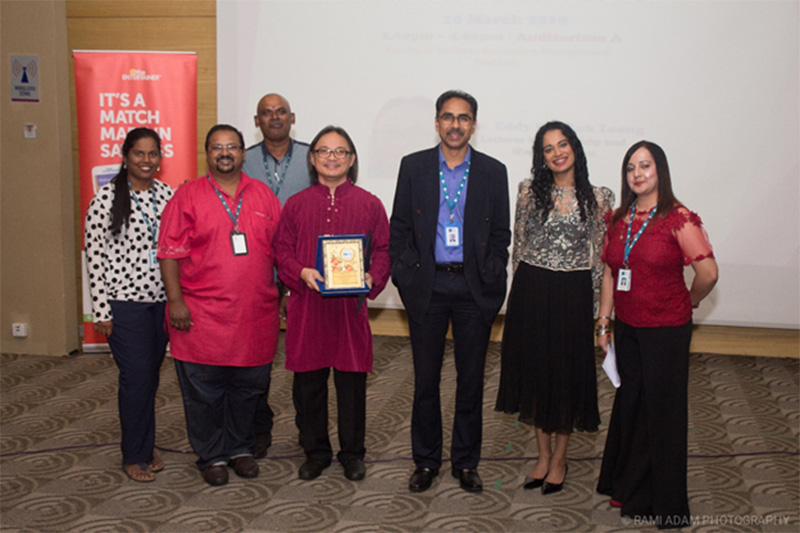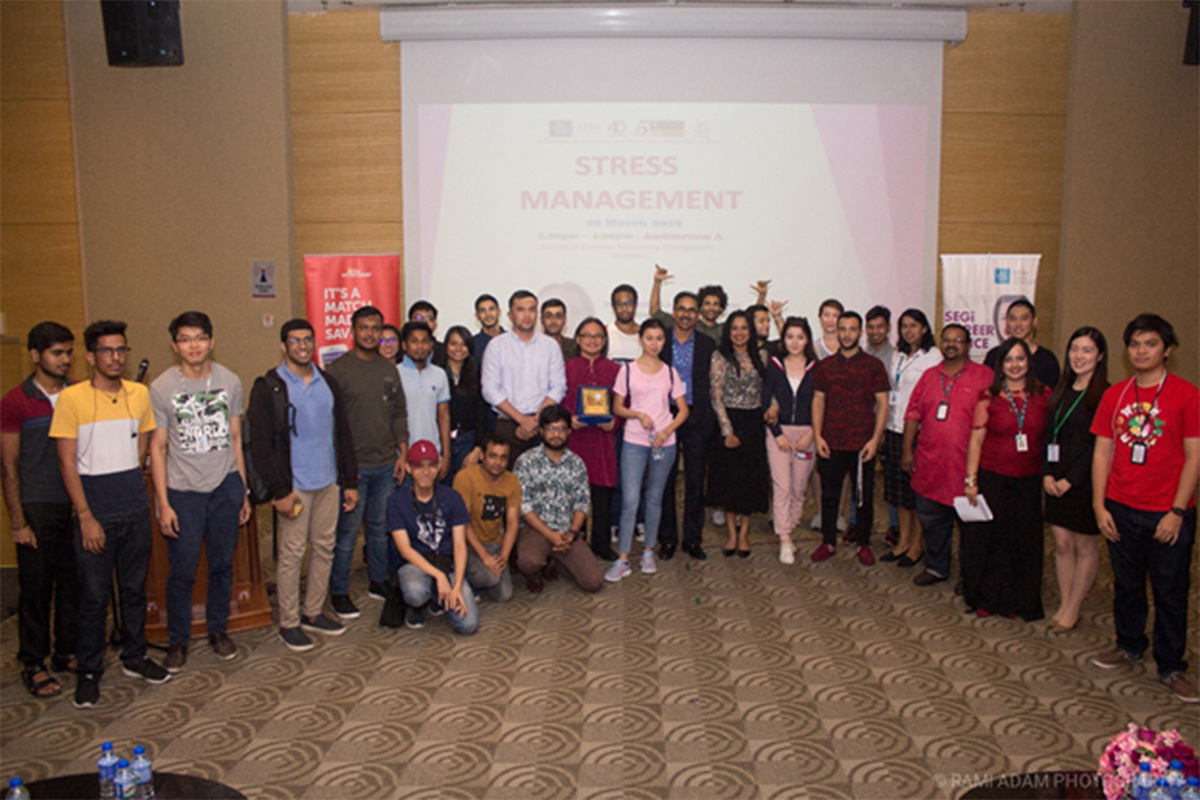STUDENT ENRICHMENT PROGRAM (SEP) ENTITLED “STRESS MANAGEMENT” ON 20th MARCH 2019 AT AUDITORIUM A, SEGI UNIVERSITY, KOTA DAMANSARA
The SEGi Enrichment Programme (SEP), has been created specially to provide our SEGi students with opportunities to enhance their soft skills through structured and well-designed seminars, workshops, conferences and symposiums. Student’s today are seeking better quality education. Enriching the students through industry practices, SEGi is fulfilling its vision of placing quality education by developing natural talents that conform the industry requirement.
Stress Management is a popular topic within academic and business world. As business environment is dynamically heading towards inevitable changes in trend, students should also be aware and ready to face those emerging challenges. To be frank, the classroom learning environment alone is inadequate in developing the necessary knowledge and skills needed. Hence, students engagement with the industry, successful business leaders and professionals are essential in preparing the students with the relevant skills such as hard skills and soft skills in order to meet the industry and job market needs.
In fact, the mandate from Higher Education Ministry, has mentioned in regards that all higher education institutions, in embracing industry 4.0, which is 2 Years in University and 2 Years in Industry (2u2i). According to the Higher Education Ministry, the move to address the challenges of Industry 4.0 was to have the industry and the academia act as one to fulfil industry and graduate needs. This is where SEGi plays pivotal roles in “We prioritize your needs” by arranging such Enrichment programmes for the benefits of the students in their academia and employability fields.
The objective of this seminar is to create and expand the awareness among students and staffs on stress management, the importance of stress management and how to overcome the stress while striving in their social, personal, academic and work performance. Here in SEGi, we are proud to share that our Enrichment Programmes have been designed to support students with their employability once they have graduated. SEGi believes and hopes that, this event will cultivate and strengthen our students confidence in becoming well rounded individuals and most sought after graduate. This progamme, is one of our initiative in giving our students the best experience within the campus before heading the job market. The brand that the students upholds, represent our contributions to the business community and society.
“Stress Management” seminar was organized by the academic team members headed by Dr. Sugumaran Selladurai the Dean, Faculty of Business, Accounting and Management (FOBAM) and students from FOBAM on 20th March 2019 at Auditorium SEGi University Kota Damansara. This seminar was officiated by Professor Dr. Azrin Esmady Ariffin; Deputy Vice Chancellor, Student Affairs of SEGi University and was attended by 200 students from SEGi University, Kota Damansara.
As part of the SEP, the FOBAM Faculty members had the privilege of inviting one of our honorable guest speaker, Mr Eddy Lee Kok Leong, Lecturer in Philosophy and World Religious, to share his knowledge and wisdom on ‘Stress Management’ and providing colorful solution towards it. Mr Eddy is a Lecturer in the American Degree Program since his return from the USA in the 1990’s. He specializes in Music Appreciation, Introduction to Philosophy and World Religions. A few years ago, Mr Eddy obtained his Master’s in Guidance and Counseling from University Putra Malaysia (UPM) and since then, he helps in counseling at an NGO occasionally.
In this seminar, Mr Eddy commenced by foremost, defining stress as pressure or tension that is applied on a material object. It is also refers to strain or tension on mental and emotional state. He states that, our body actually releases chemicals in response to stress that is known as adrenaline that increases heart rate, elevates blood pressure and boost energy supplies. There is also another chemical response to stress known as cortisol/free radicals, which known to be the primary stress hormone and this chemical actually increases the sugar (glucose) level in the brain. He states that, it is not good if those chemicals remain in our body for long time.
Mr Eddy also explained to the students that, there are two signs of stress which are known as a Good Stress and a Bad Stress. In general, good stress is short-term and pushes you to accomplish greater things. In these situations, you tend to have a lot of control over the outcome and the stress can motivate you. Bad stress can be short-term or long-term. Bad stress is often accompanied by feelings of helplessness because you don’t have a lot of control over what’s happening and you may begin to feel compressed or trapped. Good stress, also called eustress, can propel you forward and help you achieve more goals, ultimately leading to more happiness, success, or fulfillment. These are generally relatively short bouts of stress (acute stress) and provide motivation to get something done or overcome an obstacle. Even though you’re excited about something, you can still feel stressed out about it. Situations or events that could contribute to eustress: a deadline, a test, giving a speech etc. Brief bouts of stress have even been shown to enhance learning and brain function. This short-term stress isn’t around long enough to do much damage to the body and engages our natural, beneficial fight-or-flight response that we have for survival.
A deadline, for example, can be a source of good stress if it helps you focus and perform well on a project, provided you have time to relax and recover once it’s over. However, if you feel you’re always scrambling to meet a stream of deadlines regardless of how you try to prepare, you may find yourself exhausted, your performance from day to day could become weaker, and you may not have adequate time to recover. That type of situation causes bad, ongoing stress.
Ongoing, or chronic, stress can slow you down and inhibit you from doing the things you need to do. This type of stress, negative stress, is detrimental because you never really get a chance to recover from the effects of fight-or-flight—you’re constantly in a threatened state. Your body and performance suffer, so that fight-or-flight response can give you a beneficial edge or even save your life in the short-term is lost. Your immune, reproductive, excretory, and digestive systems are unable to return to normal while a threat is perceived, and all those things you’ve probably always associated with stress—heart disease, trouble focusing, irritability, memory loss, depression, weight gain, and more—really begin to become a risk. Whether the stress started out as good or bad, if it doesn’t go away, you’ll begin to suffer over time. Situations that could contribute to bad or chronic stress: relationship trouble, ongoing high demands at work with little to no reprieve, loss of a family member or friend, constant worry over assignments, jobs etc. All these circumstances, drains the energy and ability to perform. According to Mr Eddy, the causes of these bad stress begins with the losing of sense of control and this is the source of all emotional and mental problems.
Mr Eddy also highlighted that there are 3 types of stress which are known as Internal Stress, environmental stress and overwork stress. He states in the internal stress, you make yourself stress, worried about things. He also mentioned on Albert Ellis’ Cognitive Theory of Depression known as ‘Musterbation’. In this theory, Dr. Albert Ellis pointed out that depressed people’s irrational beliefs tend to take the form of absolute statements. Ellis describes three main irrational beliefs typical of depressive thinking:
- “I must be completely competent in everything I do, or I am worthless.”
- “Others must treat me considerately, or they are absolutely terrible.”
- “The world should always give me happiness, or I will die.”
Because of these sorts of beliefs, depressed people make unqualified demands on others and/or convince themselves that they have overwhelming needs that must (simply must!) be fulfilled. Ellis, referred to this tendency towards absolutism in depressive thinking as “Musterbation.” In addition to that, Mr Eddy also highlighted on Environmental Stress that actually comes from pollution, crowd, noise, family, workplace and academic work. The next stage of stress known as Overwork Stress. This type of stress usually emphasize on don’t know how to say “NO”, bad time management and don’t know when to stop or to take time to rest and relax.
Mr Eddy also pointed on the signs of stress comprises sadness, feeling burnout, engage to alcohol, smoking, addicted to coffee, feeling of overwhelmed, feeling anxious, getting sick more often, difficulty in decision making skills and difficulty in staying focus/concentration, tension, headache, trouble falling asleep, eating sweets and unhealthy food and loss of appetite, relationship issues, forgetfulness, upset stomach, having angry outburst, social withdrawal etc .In addition to that, Mr Eddy also pointed on the danger of stress which will result to physical illnesses such as high blood pressure, heart disease, obesity and cancer and also depression stage which leads to suicidal thoughts, hopelessness and social withdrawal.
Some of the ways Mr Eddy suggested in coping up with Internal Stress as follows:
- Change your thinking patterns such as from “ I must” to “I prefer”
- Talk to someone
- Make use of the counseling service
If it is the Environmental Stress, some of the ways in handling the stress according to Mr Eddy as follows:
- Try to get off from the environment
- Talk to someone
- Make use of the counseling service
If it is Overwork Stress, some of the coping up strategies as follows:
- Learn how to say “NO”
- Better time management
- Learn how to relax
- Talk to someone
- Take time off
To sum up, in order to cope up with stress management, Mr Eddy highlighted to exercise, to have adequate sleep, to have proper nutritious food, prioritizing better time management, set aside some time for yourself, breathing and relaxation such as yoga and meditation, talking to someone, have a sense of humor etc. Stress is basically a pressure and a sense of losing control. Not only can this be profoundly unpleasant, it can seriously affect our health and our work. However, it is possible to manage stress, if we use the right tools and techniques in dealing with stress.
Below are some of the famous stress management quotes to be shared:
- “The greatest weapon against stress is our ability to choose one thought over the other” – William James
- “Man is affected, not by events, but by the view he takes of them.” –Epictetus
- “It’s not the load that breaks you down, it’s the way you carry it”- Lou Holtz
- “ Its not stress that kills us, it is our reaction to it”- Hans Selye
The students indeed are very positive about the arrangement of this seminar, and we at SEGi are very happy that the students are benefiting from this seminar. The feedback that was obtained from the SEGi students that, “Stress Management” indeed provided maximum benefits, because stress management will definitely add value in their education and also in their career building. Hence, the students of SEGi can be proud that they have grab the opportunity in rightly choosing an interesting and relevant program to attend, as this program equip the students with the ability to understand stress, the importance of stress and managing stress in today’s highly competitive edge.
The organizing team members was led by the FOBAM Lecturers Dr. Sudhashini Nair and the committee members involved are Ms. Harjinder Kaur, Dr.Yamunah Vaicondam, Ms. Dineswary, Mr Ilangovan Perumal, Ms. Sandra, Ms Salwa, Ms Dilashenyi Devi and Mr Ravindran. The top level Management appreciated all the academic teams at FOBAM despite their tight lecture schedules in organizing an impressive talk under the SEP program. Well done SEGi!!

Group Photo with the Academic Team Members and Committee Members of Faculty of Business, Accounting and Management (FOBAM)

